On this page:
- The pace of change
- Technical aspects of distance education
- How does this work every day?
- Not only learning
- Mutual support
- How do schools deal with students who require special support?
- Other activities of the remote school
- Feedback and opinions
- Challenges
- Schools are doing very well—private schools are doing especially well.

Photo: Bilingual Gaudeamus School, Józefosław
In response to this extraordinary situation, Poland's Ministry of National Education has changed the date schools will remain closed until—right now it’s April 14, but no one really knows if this date will again be changed. In addition, on March 25, it was reported that schools were required to conduct normal education—to implement the core curriculum, i.e. teaching new material, with grades and tests. The eighth-grade exam is to start on April 21 and the final exams on May 4.
"If we introduce e-learning on a large scale—as we assume—then there will probably be no need to change the dates of completing school hours," says Minister Piontkowski, who boasts that over 90 percent of schools are already pursuing distance learning. The enormous difficulties in meeting public education standards have been covered in the press, in social media, and discussed by students and parents. It’s hardly surprising, considering that according to CSO data from 2019, 16 percent of Poles have no access to the internet at all. Many homes lack computers, and in some cases there’s only one currently occupied by parents working at home, often with several children.
Our Kids is the primary research platform for private education in Poland, and we're bringing you what this revolutionary change in private education looks like. If you're a private school, please visit our "COVID-19 Free Resources for Private Schools" and connect with us to share your story.
The pace of change
Private institutions are known for offering education willingly using the technological innovations of the 21st century. Of course, the complete elimination of ordinary human contact at school is new to everyone and this is a new reality that must be faced. But the experience with using new technological achievements in their work has thus far proved to be a great advantage, allowing many schools to switch to a virtual system without major problems.
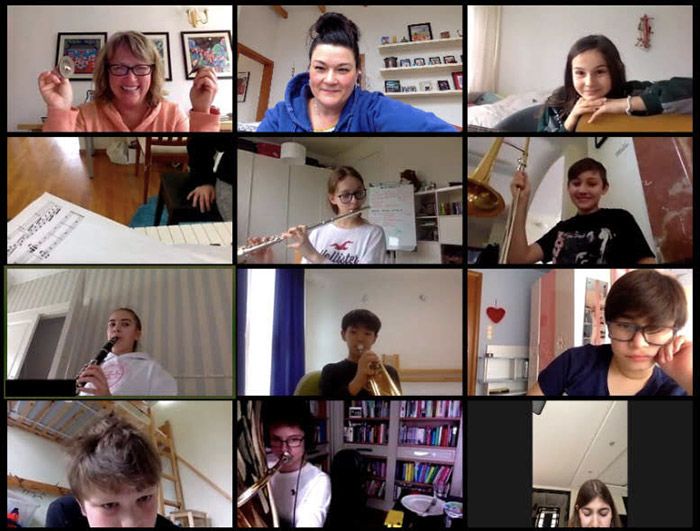
Photo: American School of Warsaw
In schools where principals have long been champions of modern technology, the transition to the new world of COVID-19 education required some acceleration, self-discipline, but it was not a shock. Jon Zurfluh, director of the American School of Warsaw (ASW), emphasizes: “The difficulty of transitioning from school classes to home virtual learning depended on the extent to which the school used new technologies in its work to date."
Agnieszka Olszewska, director of the Polish-English Primary School Edison, says that the digitization of her school has been conducted consistently for several years: "As time has shown, it was the best decision that made e-education an evolution for us, not revolution". The school quickly switched to online learning: "Technologies in our school are a tool for the teacher's creative work, students perceive them as something normal, like a normal element of education."
Artur Stępniak, the headmaster of the Bilingual Gaudeamus School in Bemowo, says: "We started creating such a school platform earlier because we wanted to start with it from September."
Grzegorz Babicki, deputy head of primary school NoBell, says: "When school closed, we had a baggage of different experiences: with the Moodle platform, with subject websites, work on the cloud. Most teachers previously had joint projects where collaboration using online tools was needed. Forms, sheets, documents, remote work sites have become very popular for many years. Knowledge of these tools made it much easier for us to switch to 'school on the web.'"
Technical aspects of distance education
Private school students are in this fortunate situation that their schools usually have extensive technical facilities—they have the equipment and support of their own school IT specialists, who have become the key here and stood up to the task: they quickly organized all the technical work, and now they’re supervising all the time, help when something doesn’t work, and make necessary changes. They provide the invaluable support of their knowledge and accessibility for teachers, but also families, on an ongoing basis, when you need help. Matthew Krasner, the director of the International American School of Warsaw, says that at his school parents and students are in direct contact with the school IT specialist.
How is such distance learning technically possible? Schools use different solutions, including Microsoft Teams (Monnet International School, Lauder-Morasha Schools, American School of Warsaw, or International American School of Warsaw), Google Classroom (No Bell, Gaudeamus Józefosław) and other Google tools—hangouts, meet (NoBell, Montessori St. Urszula Ledóchowska School), and Zoom (British International School of the University of Łódź).
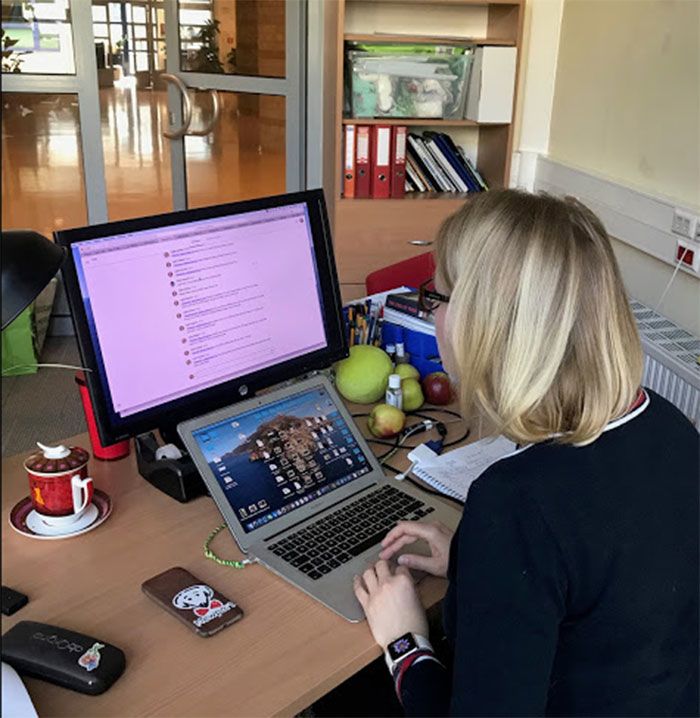
Photo: American School of Warsaw
Schools describe the details of the organization of daily work with students and specific solutions, such as "All materials needed for students to learn, are placed on the platform—Padlet. Each teacher has his own account in which he creates something like a board. On this board, he has the ability to share materials, presentations, films, etc., according to the previously defined scheme. The boards are divided into days of the week, thanks to which students or parents have no problem finding specific tasks. In addition, we also use platforms that check the knowledge of our students, such as Kahoot, and carry out tests on the ClassMarker website. We have been using the electric journal on Prymus for many years— parents have insights into student assessments at any time. In addition, to increase the comfort of students and parents, we contact them through social media platforms such as Facebook or Whatsapp" (British International School of the University of Lodz).
American School of Warsaw Director Jon Zurfluh, in addition to Google Classrooms and Zoom, praises Flip Grid and Seesaw. The prinicpal of the Polish-English Primary School Edison Agnieszka Olszewska talks about how the school has long used lessons with iPads, because "they give a lot of opportunities for student and teacher development. Lessons are conducted in an interesting and interactive way through applications from the AppStore."
The International School, as explained by director Anna Rokicka, uses the Cisco Webex Teams platform, which allows creating multi-person groups—virtual classes in which meetings are held simultaneously: “Each class has its own group, which the teacher joins. This is a video meeting during which chat can be used simultaneously. When one of the children has a connection problem, they can follow the chat lesson. Another very useful function is the board, which the lecturer makes available to the group and writes content on it, as on a regular board in the classroom."
Currently, all these and many other platforms and systems used by schools, allow for what would have been unthinkable not long ago: for direct access of students to teachers in the form of audio and video—individual and in groups, meetings of the whole class, the possibility of downloading materials to work on and send them back without having to print them off (not all families have printers), viewing the same exercise or material on a common screen, and students uploading their tasks or other materials to the network. Teachers can record sessions with students, which can then be shared with absent students or those who want to repeat the material.
Joanna Hermaniuk, who teaches English and Polish in the A-level and IGCSE programs at the British International School, draws attention to an interesting thing—that the materials on Google Classroom (a kind of subject portfolio in the form of a blog, where students post their work and peers can comment on them)—which has always been an important part of our classes, but only in spoken form) are also "aimed at enabling students to deepen reflection on their own work and the writing process, the practice of self-study, and time management. Blogs are meant to be a form of documenting the learning process, and this particular blog, “will also remain as a kind of chronicle of science in the ‘plague era.’”
Teachers exchange information and resources with parents to help children calmly get through this crisis. Christine Mamo from the Canadian School of Warsaw says: "All team members, including the school principal, share links and information about valuable websites that families at home can use to facilitate continuous education (e.g., Vooks, Epic , BrainPOP, virtual field trips, Prodigy, etc.)."
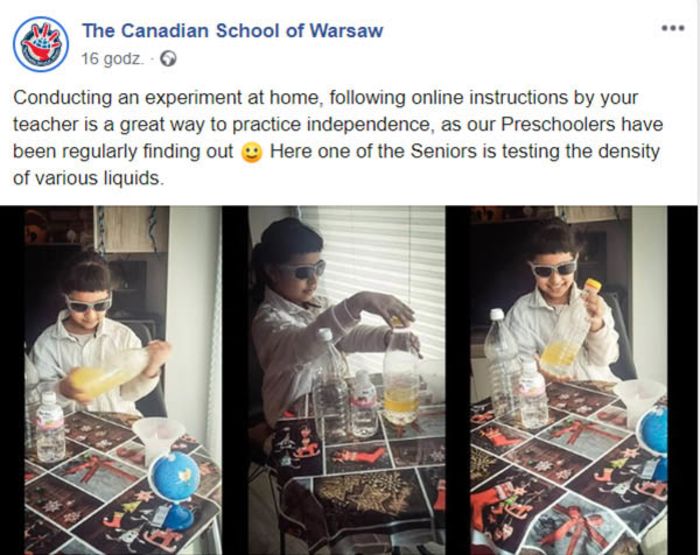
Photo: Canadian School of Warsaw, Facebook
Many schools made sure students had access to equipment, e.g. in ASW, high school students already had school equipment at home, but in the new situation those primary school students who did not have equipment got an iPad or laptops from school (equipment in which the school can install programs remotely). Gaudeamus Bemowo School helped to increase access by lending school equipment to kids who needed it.
How does this work every day?
Does virtual school work almost the same as ordinary school? ASW director Jon Zurfluh emphasizes: "We don't mean to make a copy of a school day online." It is neither possible nor desirable, because students cannot spend so many hours in front of the screen, because younger children are unable to concentrate for so long sitting in the same position in one place, without normal contact with peers. Although technically for many schools this extraordinary situation was not such a challenge, undoubtedly every school had to develop a plan B and then modify it.
The headmaster of Gaudeamus Bemowo, Artur Stępniak, says that his school doesn’t maintain the current timetable because about half of the teachers have their own children and therefore have more responsibilities because they have to help them in their education. It is the same in all others—a balance must be struck between the need to teach and occupy children and the need to not overtax the already burdened parents additionally and at the same time to take care of teachers who, in the opinion of director Jon Zurfluh now do 170% of the normal work planning and preparing classes, in a completely different format.
Many schools have shortened lessons, while others, such as the Canadian School of Warsaw, have extended the intervals between virtual lessons, some have given up homework or drastically reduced it. The principal of the Lauder-Morasha Schools Magda Tarczyńska, says: "In Grades 4 to 6, we have abandoned homework because we do not want to let our students spend the whole day using a laptop/smartphone and textbooks/workbooks. In Grades 7 and 8, work, mainly in examination subjects, is given in such a quantity so as not to burden students excessively. "
Schools use more independent work, which is not so difficult for institutions where the curriculum is based on projects. Some schools have a day devoted to their own work. In Edison, one day is intended only for project work, and ASW has considered the possibility that on Wednesdays there will only be half a day of classes, and the other half will be devoted to other work. This school also decided to standardize the schedule so that both primary and high school had a lunch break at the same time, because in one family there are often children going to both schools.
Not only learning
There are many interesting initiatives that have been implemented by various schools, remembering that all children must also have entertainment, pleasure, and relaxation, as hanging out for hours in front of the screens is unhealthy and inadvisable.
Agnieszka Olszewska, the director of the Polish-English Primary School Edison, says: "We have opened a virtual after-school club that operates outside of lessons, children can enjoy optional classes that develop their passions and interests. In order to provide our students with sustainable development, we introduced an hour-long break between lessons for physical classes with PE and dance teachers in the middle of the day."
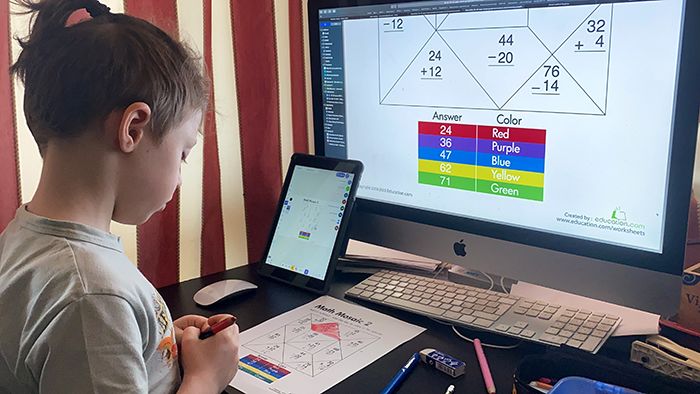
Photo: Polish-English Primary School Edison
Artur Stępniak from Gaudeamus Bemowo says that the school promotes club life by moving it to a platform where you can connect with a teacher, read a book, or do artistic work based on the teacher's instructions.
Christine Mamo, director of the Canadian School of Warsaw, reports that students are encouraged to completely disconnect from the platform at the end of the day, as they will be released home after class, and to avoid using electronic devices on weekends.
Anna Rokicka, director of The International School, says: "Due to the prolongation of the suspension, we have a plan to launch afternoon classes online. It will be a kind of school television. We have news from the e-school, reading books for individual classes, conversations with the director, advice from the psychologist, and a review of funny stories from the given day. We want our students to feel they have uninterrupted contact with peers and the school community.”
Akademeia High School introduced the so-called remote sport. As Barbara Kosewska, the school's director of communication, says: "Our trainers run sports activities tailored to home conditions remotely. They also prepared a series of short films on how to exercise at home, which we will regularly publish on our website. Dr. Ryan Bromley not only teaches his students social studies, but also runs a remote cooking course for them during lunch breaks!"
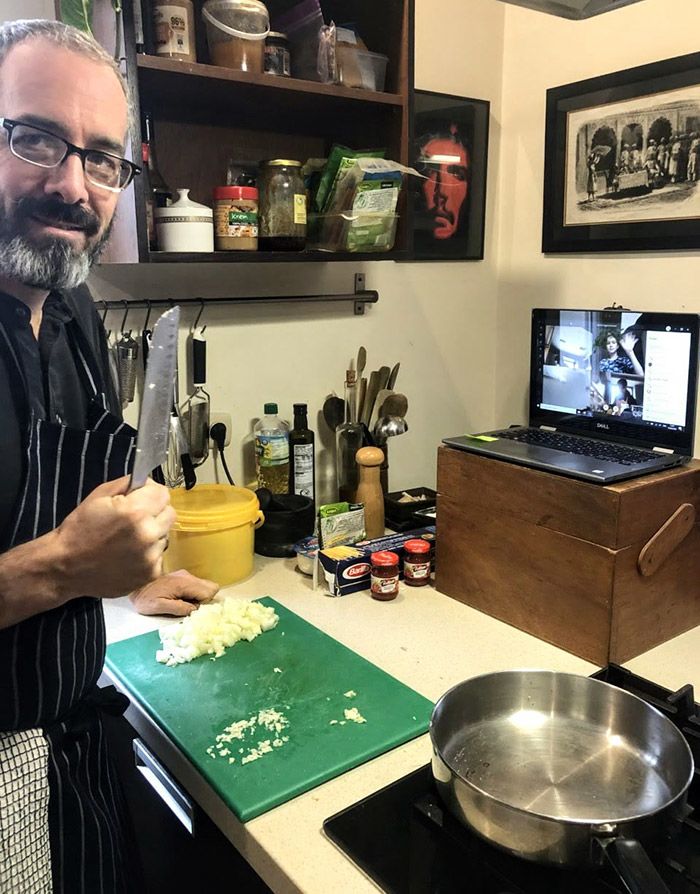
Photo: Akademeia High School
Magda Tarczyńska, principal of the Lauder-Morasha Schools, says that the school has Fridays free from online learning. As whe writes in a letter to her students: "Friday is the time to develop your passions, deepen your interests, and activities for which you don't have time every day. And share it: be sure to explain to your educators and colleagues what you did, which you usually don't have time for. Maybe you will prepare a delicious dish that has not yet been on your table (parents will certainly be delighted), draw a comic, arrange a poem, write a story, propose a dance arrangement and record it by phone, design a board game, make an album about your favorite place, or report from your day without school, etc. etc. We write about the most interesting ideas on the school's Facebook page and/or on the school's website."
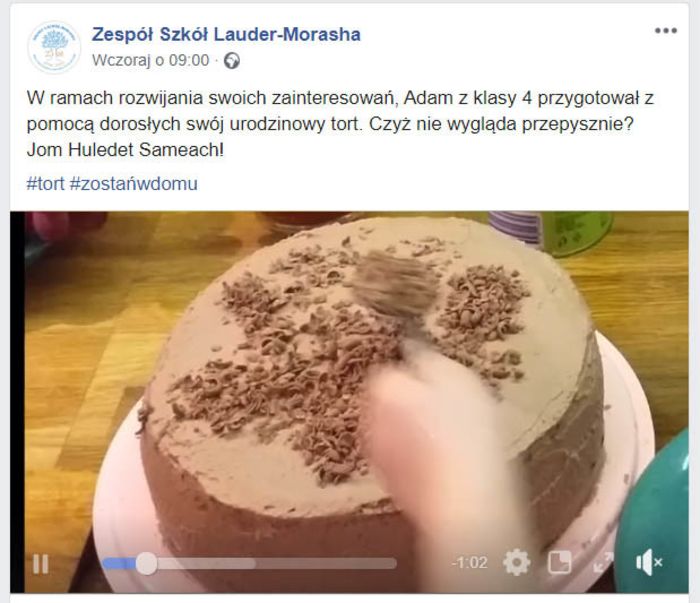
Photo: Lauder Morasha Schools
ASW Director Jon Zurfluh emphasizes that this is why, in order to maintain the good mood of students, he continues on Monday at Zoom Model United Nations. “I want students to meet. There is not much time for extracurricular activities, but some work, e.g., students play together.”
Catholic Cecylia Plater-Zyberkówna School Complex makes available to students and parents, but also to all other interested parties on the Facebook page, Sunday mass in the school chapel without the participation of students.
Mutual support
Private schools are known for providing a supportive, safe environment for children. In the Our Kids study in the fall of 2019, when we analyzed the reasons why parents choose private schools for their children, the main reason was the concern for the child's emotional security and the support such schools provide for their students. This issue is of particular importance in the current crisis.
Headmasters and teachers record daily morning videos for students, and send them warm and uplifting emails or messages on shared platforms. These are ways to make students feel better, because not everyone has mouths smiling from ear to ear all the time. For those who do not feel comfortable or have problems at home, where stressed parents are not always able to remain calm, psychologists and therapists are available by phone or online in many schools. Some schools emphasize that right now, during the crisis, even more than usual, they are an integral part of the school's operation, always available and well-versed in the home/family situation of each student.
Dr Marta Dżoga, who heads the Well-being team at Akademeia High School, has developed sets of tips for students, their parents, and teachers on how to survive this difficult time. On the school's website, students can find Dr. Dżoga's directions.
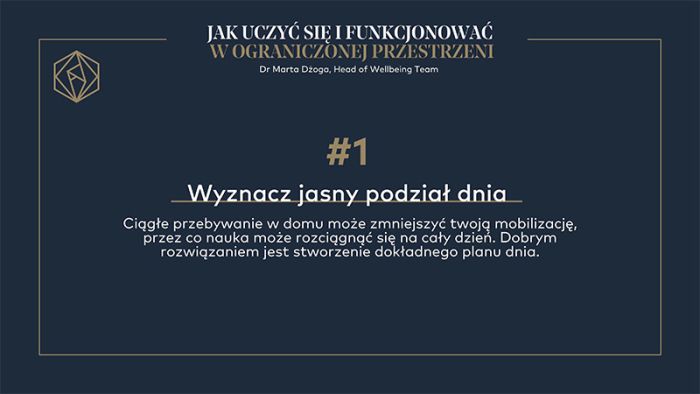
Photo: Akademeia High School
How do schools deal with students who require special support?
ASW Director Jon Zurfluh: “We have special needs children, but there are fewer children in elementary school than in high school, so it's easier for us to deal with. We have specialists who meet children separately, but also support the teaching of other teachers, just as we usually did at school. Interestingly, some children are doing better in this situation because they feel more comfortable. "
Artur Stępniak, principal of Gaudeamus Bemowo, says that at his school special educators are all online together when tutors are providing lessons to students. The principal of the Gaudeamus school in Józefosław, Sylwia Dąbrowska, explains: "We already had a lot of adjustments during stationary education when it came to the requirements of given subjects, so it was easier for us to adapt work in remote teaching. Both the educator and the psychologist are in the classroom every day. In addition, students receive material in such a form that they can cope alone. They don't get any additional homework assignments; the same rules were at school, and this is due to their psychophysical abilities. The tasks that teachers send are formulated in a short and clear way, and the students get them to a limited extent, so that they can do it themselves and so it won’t be an additional burden for them. They can connect with him and they can talk with a special educator and psychologist and the teachers used to working with them, so the change went smoothly."
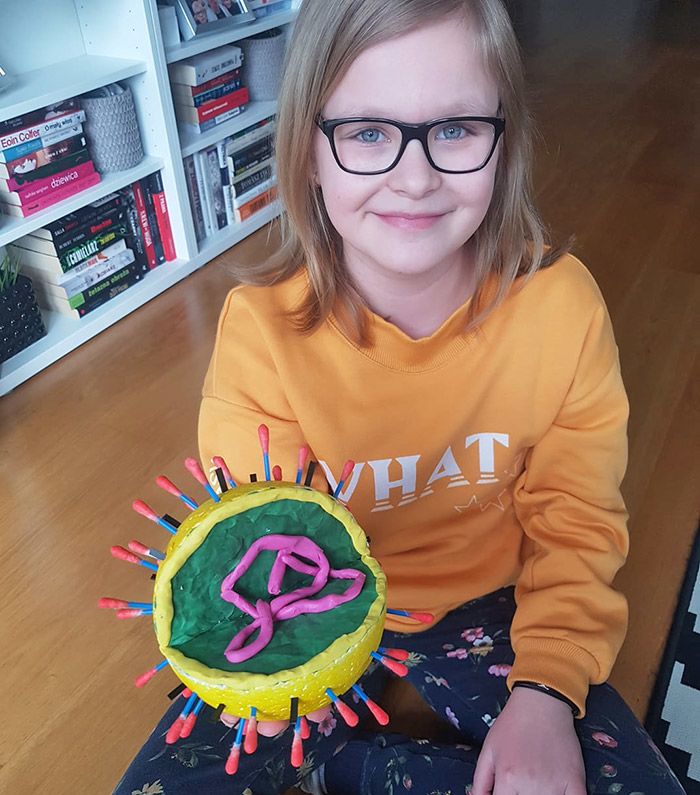
Photo: Bilingual Gaudeamus School, Józefosław
Other activities of the remote school
The school not only provides lessons and learning, but also meetings with parents, school events, and of course recruitment for the next school year. And here schools show inventiveness and ingenuity.
Akademeia reports its first online recruitment weekend: “On the weekend of March 21-22, we conducted a remote recruitment of students for the next school year. In total, we conducted 129 individual candidates' meetings with teachers, 2 online lectures, and 168 tests online! The first online lecture—introduction to the humanities—was conducted by Sonia Blank, our teacher of the humanities. The second—devoted to polymers—was given by Dr. Mark Baynes, a biology teacher. We hope that the candidates have not only demonstrated their knowledge, but also have acquired new skills. We are glad that we could meet them and talk to them. We also intend to conduct online recruitment on April 25-26. Welcome!"
Such a meeting for online candidates is also organized on Saturday, March 28 between 11.00-13.00 by the Monnet International School. "We will use the ClickMeeting webinar for this. We have already created a sub-page for this event, in which we have placed a wide variety of videos and presentations prepared by our teachers," says director Hanna Piskorska.
At the International American School of Warsaw, where the school office is closed, registration is conducted based on a Skype call.
Akademeia ensures a constant flow of information between teachers and other employees, creating a "virtual teacher's room" and a virtual group for people employed in administration.
The principal of the Lauder-Morasha School Complex, Magda Tarczyńska, talks about the group "home-school,” which she formed at Teams “for joint communication of students and teachers".
The director of the International American School of Warsaw, Matthew Krasner, records weekly video—the IAS Video Bulletin. The director Zurfluh takes so-called Facebook live with parents once a week, and on the next day the recording is available on his blog.
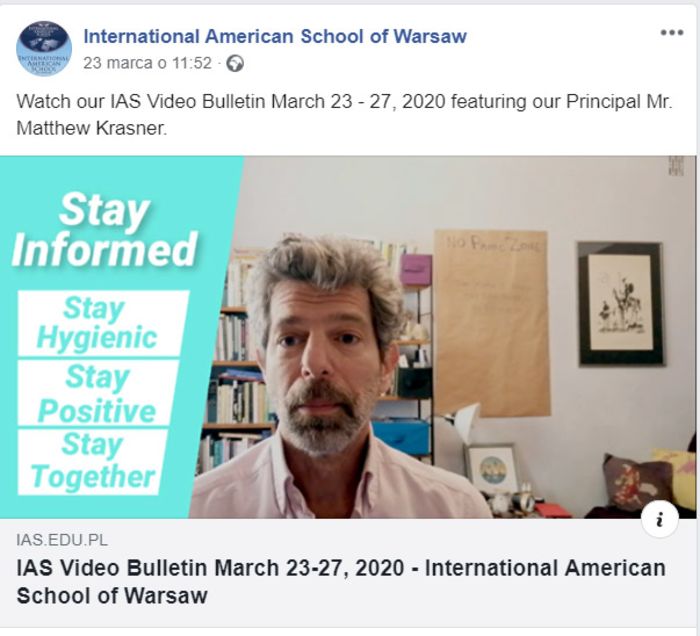
Photo: International American School of Warsaw
Feedback and opinions
For private schools close contact with students and parents is used to get regular feedback from them on a daily basis. They have their programs and implement their mission and assumptions, but they are interested in what students and their families think about their work. They conduct regular surveys, ask for comments, and use them as material for modifying the methods used. Because one thing is certain—a satisfied and respectful student is not stressed and their learning is easier and better. And the parent whose opinions are taken into account is also calmer and feels more comfortable in this new situation...
Many private schools during the crisis, when learning takes place in another format, use this method. Every week at ASW, parents are asked to rate the week. ASW Director Jon Zurfluh tells me the results showing charts prepared on the basis of questions how parents are doing, which applications work best for their children, etc. Many other schools also place great importance on close interaction with families and listening to their opinions. The Lauder-Morasha School Complex, based on a virtual meeting of the teaching council, during which "we shared our conclusions and, taking into account the observations of parents and our kids," quite significantly modified its forms of activity and the class schedule in force for the first week.
Parents are grateful—they write emails and leave thank you messages on school voicemail! Anna Rokicka, head of The International School, sums up the first week: "Dozens of emails from happy parents. Praise for wonderful lessons and thanks for the work of teachers. We have a team what's up! My parents' e-mails: ... I am impressed with the professionalism in preparation for conducting classes ..., ... the boys are delighted and literally excited about these lessons, ... we appreciate the fact that you did not allow students to get out of their daily routine and discipline. It is very important, especially now that the days spent at home have their rhythm ...”
Many children are very happy. Paula Roy Chowdhury from the British International School of the University of Lodz says that students like the distance learning so much that they are asking for the possibility of introducing such classes in the future. Zbigniew Stępień, deputy director of the High School No Bell, says with satisfaction: "Students agree: we were ready for it :)."
Challenges
Zbigniew Stępień, deputy director of high school No Bell, says that the biggest challenge is working with younger students—they require intensive support from parents, who often have to be at work, physically or remotely. Work goes smoothly with older students.
The principal of the Gaudeamus school in Józefosław Sylwia Dąbrowska says that her school has ensured proper coordination of the schedule with parents in the case of these younger children, where the parent works remotely and there is only one computer at home.
ASW director Jon Zurfluh emphasizes that the school wants children to be active and also, especially younger children, to be involved at home in creative play and games that stimulate imagination, reading books with parents. Smaller children need a lot more technical support. Older students are much easier to adapt to the new situation, are familiar with new technologies, and almost naturally enter the new reality. The younger the child, the more help is needed from parents, and they not only often do not have time, but also often lack skills. In international schools, the difficulty is that some parents do not know English, so it is difficult for them to help children.
Principal Zurfluh says he is worried about universities, mainly British ones—about how the current situation will affect admission to these universities. All is well with American universities: they are finalizing their arrangements with the candidates.
Grzegorz Babicki, deputy head of NoBell primary school, says: "We miss direct contact. We see each other in reality '2d', and yet reality is in '3d.' Children also miss their friends, classmates—it's a difficult experience for them. There has been a change in the proportion of time use, especially among teachers. The technical support is using more hours for online classrooms, websites, and emails. In addition, some love new technologies, others feel better in the ‘analogue’ situation."
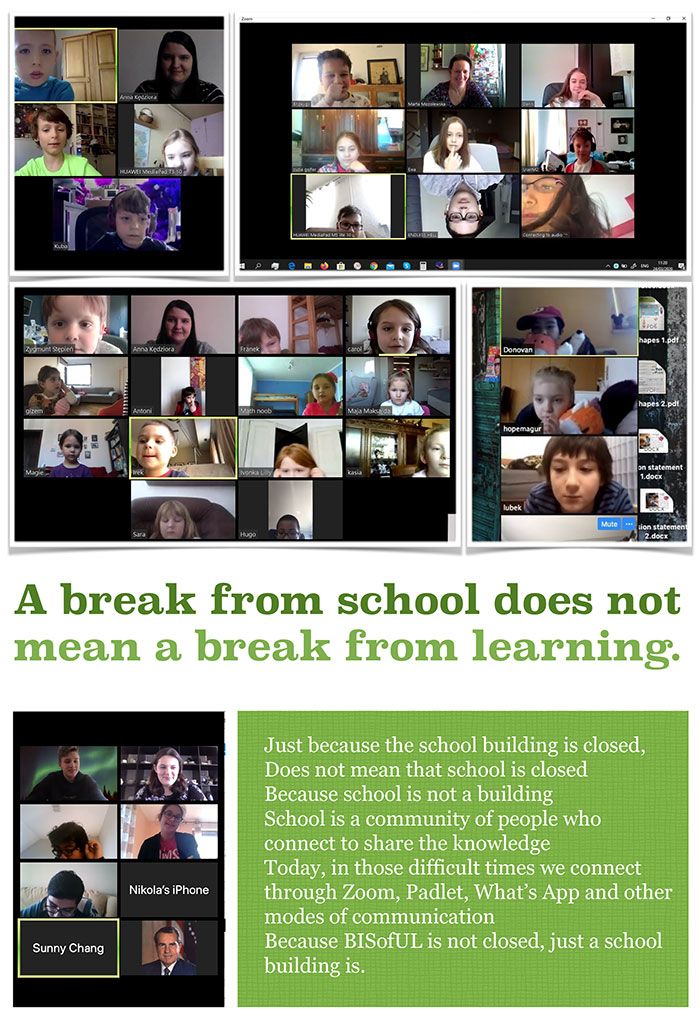
Photo: British International School of the University of Łódź
Schools are doing very well—private schools are doing especially well.
In the current crisis situation, parents highly value sending their kids to private school, despite the fact that you have to pay for them.
One of the unique features of private schools is small groups, which under normal conditions allows for a significant individualization of teaching, direct teacher contact with each student, and accurate knowledge of each student’s character, needs, potential, and expectations. When school has moved online, this is an invaluable advantage of private school. This is because the teacher does not have to teach 30 students in one class, and because teachers know their students, and strong bonds are formed between them, allowing for close cooperation, care. and mutual respect.
Private schools have handled the crisis well, but this is not only due to technological advancement, staff, and IT specialists. It is true that they most often have these advantages. But moreover, although they care very much about the level and quality of teaching, they largely focus on interpersonal relationships, building community, and shaping empathy. That is why they are doing so well in the unprecedented time we’re now experiencing..
•••
And finally, something that perfectly illustrates the atmosphere in private schools—the morning message of the principal of the Lauder-Morasha School Complex, Magda Tarczyńska, to her students ("Every morning, with short entries, I am trying to motivate everyone to act,” says the principal):
Hello everyone!
Rise and shine!
Here we are, another sunny, beautiful day at the Lauder-Morasha Home-School. Grab your laptop or smartphone, sit back, and relax.
Day 3. Ahead of us! Let's get started ...
People who read this also viewed:
- Warsaw private schools
- Kraków private schools
- Poznań private schools
- Wrocław private schools
- Łódź private schools
- Rzeszów private schools
- Gdańsk & Gdynia private schools
-
Advice Guide
- ABC of educational terminology: Glossary of terms and concepts
- The admissions process
- Advantages and disadvantages of studying in an international school
- The application process
- Benefits of Polish private schools
- Bilingual schools
- Boarding schools
- Choosing a private or nonpublic school in Poland
- Compare schools in Poland
- English schools in Warsaw
- Homeschooling
- International schools in Kraków
- International schools
- Private school interviews
- Music education
- Myths about private education
- Non-public schools in Poland
- School open houses
- Our Kids Interview: Get to know EF Academy Oxford
- Our Kids Interview: Get to know Open School
- Our Kids interview: Get to know Regent College International Schools
- Our Kids Interview: Get to know The American School of Warsaw
- Our Kids Interview: Get to know The British School Warsaw
- Our Kids Interview: Get to know Wrocław Cosmopolitan School (two interviews, new video)
- Poland school profiles
- Private day schools
- Gifted schools & programs
- Private Jewish schools in Poland
- Language schools
- Private school tuition and costs in Poland
- Private schools in Poland
- Private schools in Poland offering French-language immersion
- English immersion schools
- Poland school uniforms
- Private special needs schools in Warsaw
- Public versus non-public schools in Poland
- Private school questions
- Private school rankings
- Reasons for choosing private schools - Our Kids’s survey report
- Religious schools
- Schools and classes for children with ADHD in Poland
- Social primary schools
- Social Schools
- Special educational needs (SPE) certificates
- Special needs schools
- Study abroad at a private school
- The first annual non-public school fair in Poland
- The first annual Our Kids non-public school expo in Warsaw was a great success
- Third Private School Expo in Warsaw - summary
- Types of schools
- Types of schools in Warsaw
- Warsaw preschool costs
- Why private school?
- Why parents go private
-
Grades
- Boarding high schools
- Choosing a high school in Poland
- Mokotow High School Campus - a new Warsaw high school and Thames British School campus
- Montessori nursery schools
- Montessori preschools
- Our Kids Interview: Get to know English Montessori School Katowice
- Our Kids Interview: Get to know FSA School
- Our Kids Interview: Get to know KIDS & Co.
- Our Kids Interview: Get to know Polish British Academy of Warsaw
- Our Kids Interview: Get to know The English Playhouse and The English Primary
- Poland education: grade levels
- Preschools in Warsaw
- Private & non-public preschools
- Private & non-public primary schools
- Private bilingual elementary schools in Warsaw
- Private high schools
- Private high schools in Warsaw
- Private middle schools
- Nursery schools
- Private primary schools in Warsaw
- Social high schools
-
Locations
- Boarding schools in Warsaw
- English schools in Kraków
- International Baccalaureate (IB) schools in Warsaw
- International schools in Warsaw
- Montessori schools in Warsaw
- Non-public schools in Warsaw
- Our Kids Interview: Get to know EF Academy
- Our Kids interview: Get to know Excellence in Education better
- Our Kids Interview: Get to know PRIMUS Non-Public Primary School No. 47 and Non-Public Secondary School
- Our Kids Interview: Get to know the Canadian School of Warsaw
- Our Kids Interview: Get to know The Primary and Secondary Schools of the Sisters of Nazareth in Warsaw
- Private Catholic and Christian schools in Warsaw
- Private day schools in Warsaw
- Private language schools in Warsaw
- Private schools in Bialystok
- Bydgoszcz schools
- Częstochowa schools
- Private schools in Gdańsk & Gdynia
- Katowice schools
- Private schools in Krakow
- Lublin schools
- Olsztyn schools
- Private schools in Poznań
- Private schools in Rzeszów
- Szczecin schools
- Private schools Warsaw
- Private schools in Wrocław
- Zielona Góra schools
- Private schools in Łódź






 POL
POL CAN
CAN